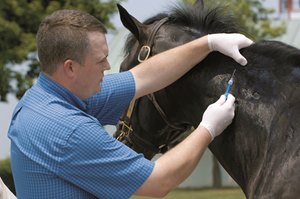CHRB Approves Measure to Require Microchips in Horses


The California Horse Racing board unanimously approved a measure to require identifying microchips for Thoroughbred racehorses in the state during its regular monthly meeting Sept. 28 at Los Alamitos Race Course.
The proposal was based on amendments to existing rules regarding entries and eligibility for horses to race, among others, and would make any horse in the state without an identifying microchip (or a waiver from the board of stewards) ineligible to race.
The CHRB instituted a pilot program to test the use of identifying microchips at Northern California sites Golden Gate Fields and Pleasanton in 2014 with the goals being "to track horse movement in and out of licensed CHRB (enclosures), improve identifying capabilities, and prevent breakouts of infectious diseases." CHRB conversations regarding microchip use in racehorses date back to at least 2000.
"It's been a success in Northern California and it's beginning to be implemented in Southern California," said CHRB general counsel Philip Laird. "The buy-in from the tracks and the trainers has really been excellent, and with that, we finally have a set of regulations to put this officially in place in California, bringing our (sport) into the 21st century, but ahead of everybody else at the moment."
The proposal got written support from The Jockey Club's Thoroughbred Safety Committee and was approved by a vote of 6-0.
"Microchips have become accepted in all major international racing jurisdictions and beginning with the foal crop of 2017, microchip implant has become a condition of registration in the American Stud Book," The Jockey Club executive vice president and executive director Matt Iuliano wrote in a letter to the CHRB. "We support these changes and look forward to other jurisdictions following California's lead."
CHRB executive director Rick Baedeker said there are approximately 900 horses currently implanted with identifying microchips at Golden Gate, but said there are still about 4,000 horses that need to receive microchips.
"We have a plan and we're at a point now where we have to lateral the responsibility of this chipping process to the industry. ... So far everybody has been very supportive, " Baekeder said. "There's a cost associated with this next step of about $50,000 for the chips and the readers, and the industry has stepped up without objection."
Although Baedeker said "we just don't know how long (it is) going to take" to get every racehorse in the state implanted with a microchip, he estimated the new requirements would become active policy in 12-18 months.
"I wouldn't want to put a timeline together that becomes some kind of constraint that forces the issue, because ... as the newly chipped crops start arriving, this is going to all be automatic," Baedeker said.
The amendments still need to be approved by California's Office of Administrative Law.
